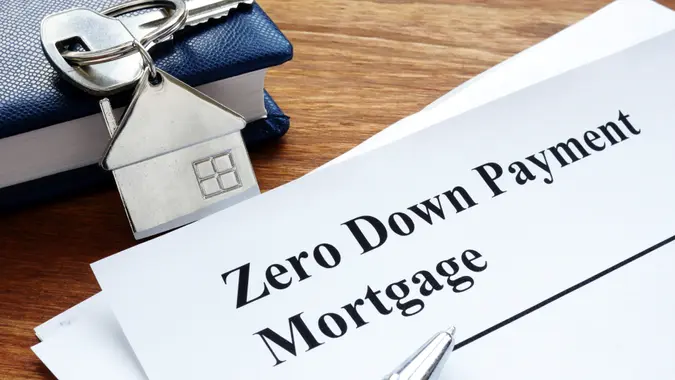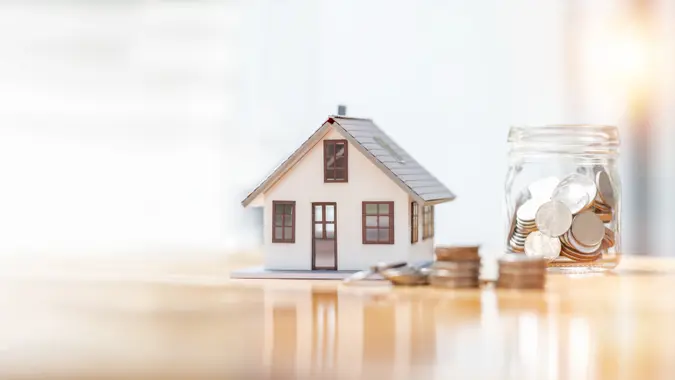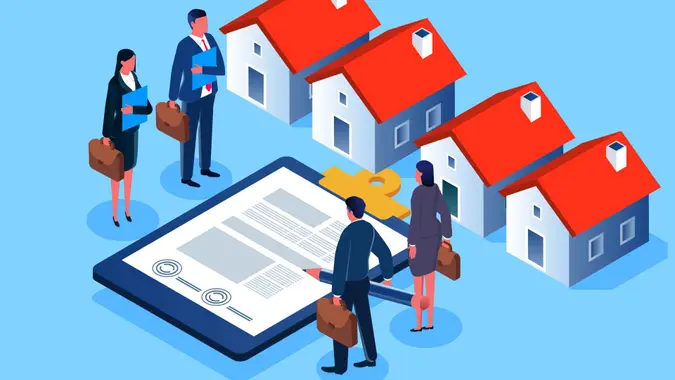Mortgage Applications Are Being Rejected as Rates Reach 8% — How to Get Approved

Commitment to Our Readers
GOBankingRates' editorial team is committed to bringing you unbiased reviews and information. We use data-driven methodologies to evaluate financial products and services - our reviews and ratings are not influenced by advertisers. You can read more about our editorial guidelines and our products and services review methodology.

20 Years
Helping You Live Richer

Reviewed
by Experts

Trusted by
Millions of Readers
The double whammy of mortgage rates nearing 8% and increasing home prices is continuing to keep homebuyers on the sidelines. Making matters worse, lenders are increasingly denying applicants loans because of insufficient income than at any point since that data was first collected and reported in 2018, according to a new report from the Consumer Financial Protection Bureau (CFBP).
The overall denial rate for home purchase applications for all applicants was 9.1% in 2022, compared to 8.3% in 2021.
“As interest rates rise, it is becoming increasingly difficult for potential homebuyers to qualify to purchase a home,” said Tai Christensen, president of Arrive Home. “This is especially true for first-time homebuyers who do not have the benefit of equity appreciation from their current home to transfer to a new home purchase.”
On top of that, home prices rose in September for the second month in a row, as the inventory shortfall lingers, according to Realtor.com’s September Monthly Housing Trends released Oct. 5.
As for the average rate on the 30-year fixed mortgage rate (FRM), it rose to 7.70% on Oct. 4, according to Mortgage News Daily.
To put this in context, a year ago at this time, the 30-year FRM averaged 6.7%. And for the same time of the year in 2021, it averaged 3.01% (and 2.88% in 2020), according to Freddie Mac data.
What Can Homebuyers Do?
Down Payment Assistance
According to Christensen, potential homebuyers who are initially rejected should ask their loan officer about programs and products, such as down payment assistance, that can provide an alternative path to a successful purchase.
“In this type of market using Down Payment Assistance (DPA) can be a powerful tool to increase a borrower’s chances of successfully qualifying for a home loan,” she said.
She further explained that using DPA improves approval chances by solidifying the borrower’s down payment requirements without affecting the borrower’s reserves, or savings.
“It also increases the loan affordability by lowering upfront costs, and some DPA programs have options to cover some, or all, of the closing costs. These solutions decrease the financial burden to the borrower during the closing process, and can increase their chances of closing a successful transaction,” she explained.
Set Realistic Budgets and Keep Track of Your Credit Score
It’s important to be realistic about your budget and you might come to the conclusion that you might need to rent for longer and/or save for a larger down payment, said Ted Rossman, senior industry analyst at Creditcards.com.
You might also consider a cheaper location or more of a fixer-upper, he added.
Rossman further explained that credit quality matters a lot, too. For instance, as FICO notes, someone with top-notch credit could qualify for a mortgage rate that’s about a half-point lower than someone with “good” but not “excellent” credit.
“On a $300,000 loan, that’s a difference of about $100 per month, which would be $36,000 over the course of a 30-year mortgage,” he said. “Put your best foot forward from a credit scoring standpoint.”
He suggested getting credit reports from AnnualCreditReport.com before applying for a mortgage and getting any errors corrected. Something else that you can do relatively quickly to improve your credit score is to lower your credit utilization ratio — credit you’re using divided by the amount of credit available to you, especially on credit cards.
“It’s usually reported on your statement date, so make an extra mid-month payment or ask for a higher credit limit to knock this ratio down,” he added.
Use Calculator Tools
Despite the extremely challenging market for homebuyers, there are a slew of tools to tap into that will up homebuyers’ odds of success, according to Danielle Hale, chief economist at Realtor.com.
For instance, an affordability calculator can help you figure out the right home price range given your income and down payment funds and qualification criteria that are similar to those a mortgage lender would use.
“You can then save this result to your profile on Realtor.com to leverage the Buying Power tool in your home search and see results that are tailored to your budget,” said Hale.
There are also mortgage affordability calculators, which can help you assess different scenarios- such as a change in down payment funds or mortgage rates- and how this can affect your monthly mortgage payment.
Yet, Hale noted that the macro environment remains challenging. In turn, first-time homebuyers who are choosing between buying and renting may ultimately end up choosing to rent, as monthly costs in all but three of the 50 largest markets are lower for renting over buying a starter home.
“And with rents trending lower — down 0.6% in August — and home prices higher — up 0.4% in September — this gap is likely to stick around,” she added.
Other Options
According to Paul Mueller, senior research fellow at the American Institute for Economic Research, other routes to qualify for a mortgage include reducing your debt and increasing your income, which is “easier said than done.”
A less common option is inquiring whether you can assume the mortgage of the person you are buying a house from.
And the least common option is to talk to your realtor about properties that have “owner financing” available.
“This is more common than people realize and gives you a chance to negotiate the terms of a loan without having to go through the trouble of getting a mortgage from a bank,” said Mueller. “Once you own a property, it can be easier to refinance down the road to pay off your private debt to the previous owner.”
More From GOBankingRates
 Written by
Written by 

























